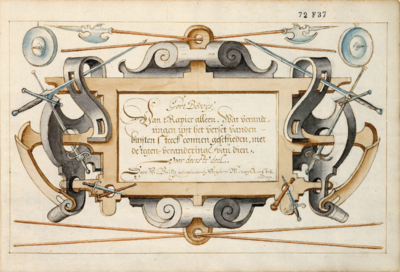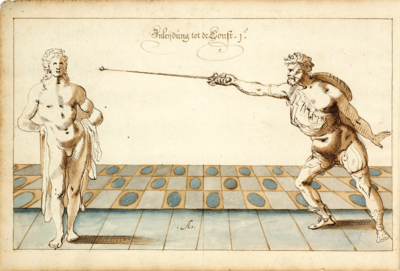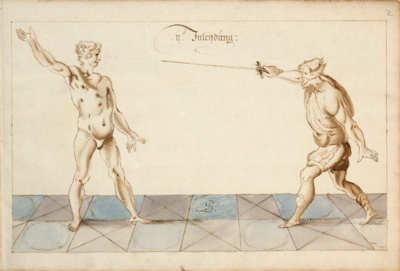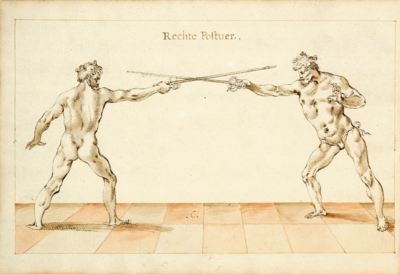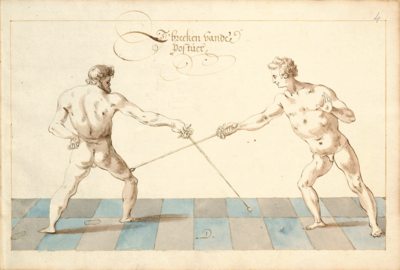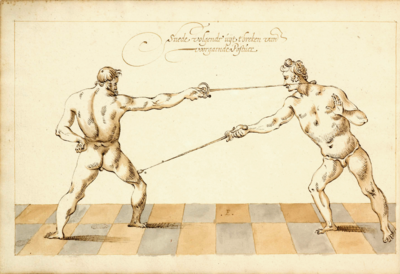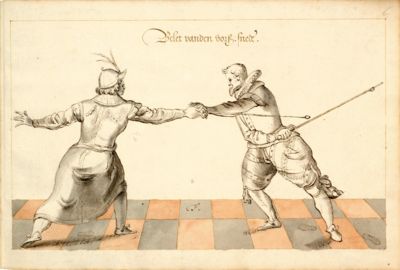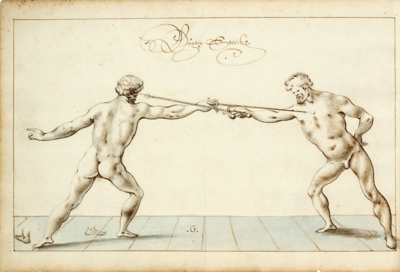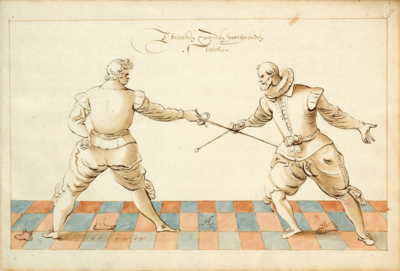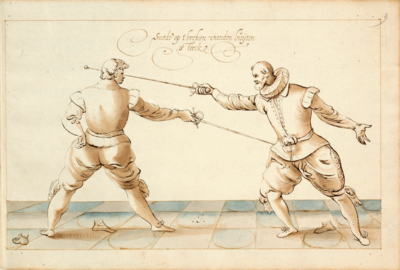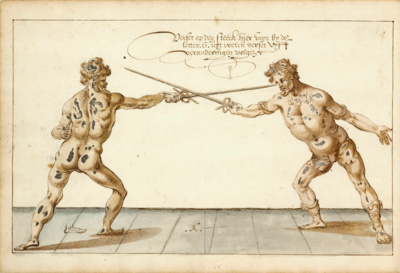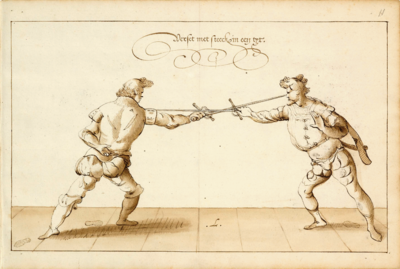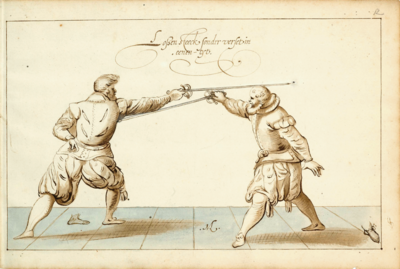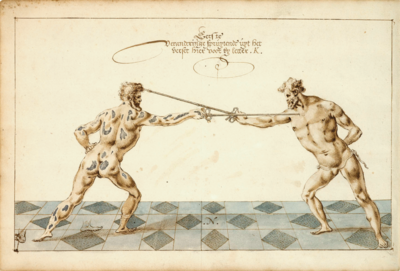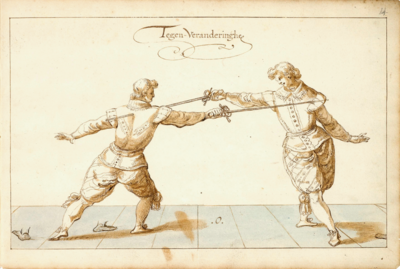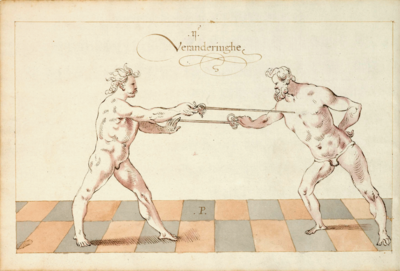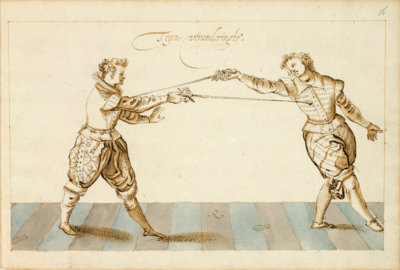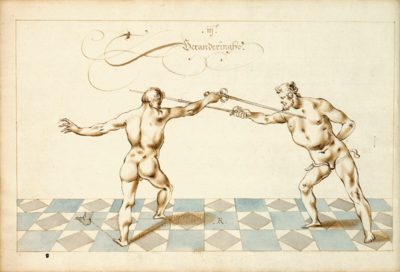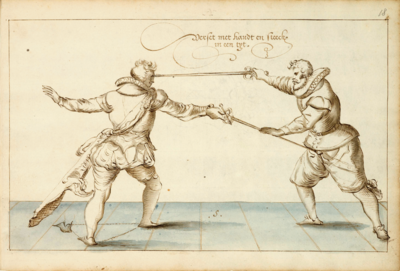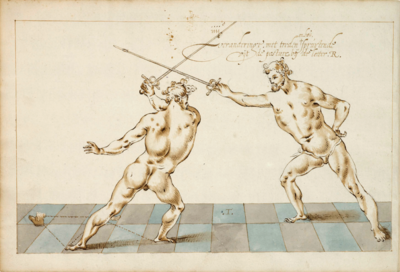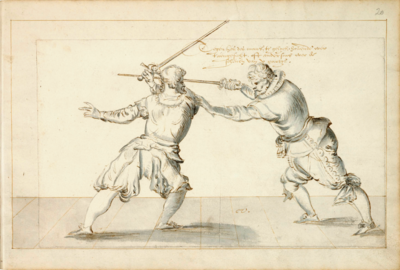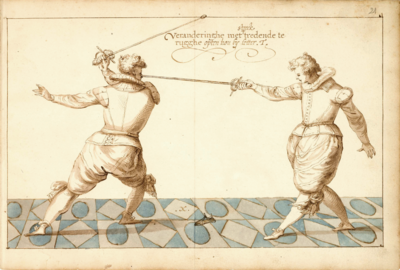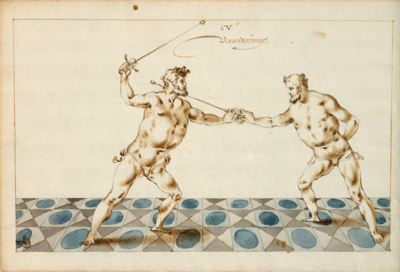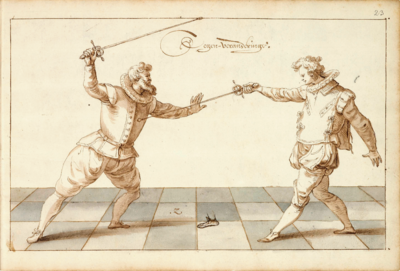|
|
You are not currently logged in. Are you accessing the unsecure (http) portal? Click here to switch to the secure portal. |
|
|
Do you have permission to re-use this image? Just because scans appear on Wiktenauer does not mean that they are free to use. Wiktenauer is a 501(c)(3) nonprofit, and many of the scans we host are only licensed for nonprofit use. In other cases, the scans have no standard license and Wiktenauer has received special permission to host them (and can't grant that permission to anyone else). The license terms appear in the Copyright and License Terms box at the bottom of the page that sent you here. When in doubt, always check with the museum or library that owns a manuscript before publishing or otherwise reusing its scans. |
Difference between revisions of "Pieter Bailly"
| Line 34: | Line 34: | ||
| wiktenauer compilation by= | | wiktenauer compilation by= | ||
| − | | spouse = | + | | spouse = {{plainlist |
| + | | Willempgen Wolfertsdr. | ||
| + | | Cathelina De Witt | ||
| + | }} | ||
| partner = | | partner = | ||
| − | | children = | + | | children = {{plainlist |
| + | | Anna | ||
| + | | Anthonij | ||
| + | | Neeltgen | ||
| + | | [[David Bailly|David]] | ||
| + | }} | ||
| relatives = | | relatives = | ||
| influences = [[Ludolph van Ceulen]] | | influences = [[Ludolph van Ceulen]] | ||
| − | | influenced = [[ | + | | influenced = [[Girard Thibault d'Anvers]] |
| awards = | | awards = | ||
| signature = | | signature = | ||
| Line 45: | Line 53: | ||
| below = | | below = | ||
}} | }} | ||
| − | '''Pieter Bailly''' (1554-after 1608) was a [[century::17th century]] [[nationality::Dutch]] artist and [[fencing master]]. Born in Antwerp, he settled in Leiden in 1577 and married | + | '''Pieter Bailly''' (1554-after 1608) was a [[century::17th century]] [[nationality::Dutch]] artist and [[fencing master]].<ref name="p66">Galas and Steepnut, p. 66.</ref> Born in Antwerp, he settled in Leiden in 1577 and married Willempgen Wolfertsdr.; they would eventually have two daughters, Anna and Neeltgen, and two sons, Anthonij and famed artist [[David Bailly]] (1584–1657).<ref name="Keblusek 19">Marika Keblusek. "The Life of David Bailly". ''David Bailly - Tijd, dood en ijdelheid.'' Waanders Uitgevers, 2023. p. 19.</ref> |
| − | + | Bailly worked as an engraver and calligrapher for the [[Universiteit Leiden]] (just established in 1575) and the Leiden town council, and he was eventually also hired as a handwriting teacher by the University in 1582.<ref name="Keblusek 19"/> In 1586, he engraved and published a calligraphy textbook for teachers and students (subsequent editions were issued by an Amsterdam printer). In 1590, he was appointed second beadle (mace-bearer) of the University, further increasing his status, and performed various high-profile calligraphic projects for the Leiden council in that decade, and was eventually allowed to open his own shop.<ref name="Keblusek 19">Marika Keblusek. "The Life of David Bailly". ''David Bailly - Tijd, dood en ijdelheid.'' Waanders Uitgevers, 2023. p. 20.</ref> | |
| − | In 1594, Bailly became a provost at the | + | In 1594, Bailly became a provost or assistant teacher at the school of German mathematician and fencing master [[Ludolph van Ceulen]] (1539-1610) at the University.<ref name="p66"/> He swore a fencing master's oath on 22 September 1597, which, among other things, prevented him from teaching fencing outside of van Ceulen's school. In 1598, he was dismissed from his position at the University under accusations of misconduct, but when he attempted to open his own fencing school to earn more income, van Ceulen filed a complaint with the Leiden council that he was violating his oath and the council shut his school down in 1602.<ref>Galas and Steepnut, p. 68.</ref> |
| − | In response, Bailly moved to Amsterdam that same year and received an appointment as city fencing master. In Amsterdam, he composed a short fencing treatise about the use of the rapier, ''[[Cort Bevvijs' Van t'Rapier alleen (MS KB.72.F.37)|Cort Bevvijs' Van t'Rapier alleen]]'' (KB.72.F.37), which doesn't follow | + | In response, Bailly moved to Amsterdam that same year and received an appointment as city fencing master. In Amsterdam, he composed a short fencing treatise about the use of the rapier, ''[[Cort Bevvijs' Van t'Rapier alleen (MS KB.72.F.37)|Cort Bevvijs' Van t'Rapier alleen]]'' (KB.72.F.37), which doesn't follow the typical Italian teachings that had eclipsed other fencing traditions in the German region and the lowlands, and may represent a local Dutch tradition or an older German tradition learned from Cuelen.<ref name="p69">Galas and Steepnut, p. 69.</ref> It's likely that he executed both the calligraphy and the illustrations in the manuscript himself (though his son David could also have been involved).<ref name="p66"/> The introduction indicates that the manuscript is volume 1 of a larger work, but it's unknown if he ever produced any further writings. |
The date of his first wife's death is unknown, but Bailly married Cathelina De Witt in 1604. The final record of Bailly's life has him leaving Amsterdam in 1608 to spend a year in Germany, and the date and location of his death are unknown.<ref name="p69"/> | The date of his first wife's death is unknown, but Bailly married Cathelina De Witt in 1604. The final record of Bailly's life has him leaving Amsterdam in 1608 to spend a year in Germany, and the date and location of his death are unknown.<ref name="p69"/> | ||
Revision as of 02:04, 23 November 2025
| Pieter Bailly | |
|---|---|
| Born | 1554 Antwerp |
| Died | after 1608 Amsterdam (?) |
| Spouse(s) |
|
| Children |
|
| Occupation |
|
| Nationality | Dutch |
| Alma mater | Universiteit Leiden |
| Influences | Ludolph van Ceulen |
| Influenced | Girard Thibault d'Anvers |
| Genres | Fencing manual |
| Language | Dutch |
| Notable work(s) | Cort Bevvijs' Van t'Rapier alleen |
| Manuscript(s) | MS KB.72.F.37 (1602-1608) |
| First printed english edition |
Galas and Steenput, 2011 |
Pieter Bailly (1554-after 1608) was a 17th century Dutch artist and fencing master.[1] Born in Antwerp, he settled in Leiden in 1577 and married Willempgen Wolfertsdr.; they would eventually have two daughters, Anna and Neeltgen, and two sons, Anthonij and famed artist David Bailly (1584–1657).[2]
Bailly worked as an engraver and calligrapher for the Universiteit Leiden (just established in 1575) and the Leiden town council, and he was eventually also hired as a handwriting teacher by the University in 1582.[2] In 1586, he engraved and published a calligraphy textbook for teachers and students (subsequent editions were issued by an Amsterdam printer). In 1590, he was appointed second beadle (mace-bearer) of the University, further increasing his status, and performed various high-profile calligraphic projects for the Leiden council in that decade, and was eventually allowed to open his own shop.[2]
In 1594, Bailly became a provost or assistant teacher at the school of German mathematician and fencing master Ludolph van Ceulen (1539-1610) at the University.[1] He swore a fencing master's oath on 22 September 1597, which, among other things, prevented him from teaching fencing outside of van Ceulen's school. In 1598, he was dismissed from his position at the University under accusations of misconduct, but when he attempted to open his own fencing school to earn more income, van Ceulen filed a complaint with the Leiden council that he was violating his oath and the council shut his school down in 1602.[3]
In response, Bailly moved to Amsterdam that same year and received an appointment as city fencing master. In Amsterdam, he composed a short fencing treatise about the use of the rapier, Cort Bevvijs' Van t'Rapier alleen (KB.72.F.37), which doesn't follow the typical Italian teachings that had eclipsed other fencing traditions in the German region and the lowlands, and may represent a local Dutch tradition or an older German tradition learned from Cuelen.[4] It's likely that he executed both the calligraphy and the illustrations in the manuscript himself (though his son David could also have been involved).[1] The introduction indicates that the manuscript is volume 1 of a larger work, but it's unknown if he ever produced any further writings.
The date of his first wife's death is unknown, but Bailly married Cathelina De Witt in 1604. The final record of Bailly's life has him leaving Amsterdam in 1608 to spend a year in Germany, and the date and location of his death are unknown.[4]
Contents
Treatise
Illustrations |
Archetype | |
|---|---|---|
Short proof of the single Rapier. What changes can take place from the parry of the outside thrust, with the counter-changes of them. For the first part.
By P[ieter] Bailly, accepted fencing master of Amsterdam. |
[01r] Cort Bewijs’ Van t’Rapier alleen. Wat veranderingen uijt het verset vanden buijten steeck connen geschieden, met de’tegen-veranderinge’ van dien. Voor deerste deel. Door P. Bailly aengenomen Scherm-Mr. van Amstelredam. | |
First Introduction to the Art |
[01v] Inleijdúng tot de Konst .ie. .A. | |
Second Introduction |
[02r] .ije. Inleijdúng: .B. | |
Straight[5] posture. |
[03v] Rechte Postuer. .C. | |
The breaking of the posture. |
[04r] T’breeken vande Postúer. .D. | |
Cut following from the breaking of the preceding posture. |
[05v] Snede volgende úijt t’breken van voorgaende Postúer. .E. | |
Prevention of the preceding cut. |
[06r] Belet vanden vorß. snede. .F. | |
Outside Thrust. |
[07v] Búyten Steecke. .G. | |
The breaking of the preceding thrust. |
[08r] T’breecken vanden voorgaenden steeck. .H. | |
Cut following the breaking of the outside thrust. |
[09r] Snede op t’breken vanden búijten steecke. .I. | |
Displacement to the thrust before at the letter .G. from which displacement five changes follow. |
[10v] Verset op den steeck hier voor by de letter .G. úyt welck verset vyff veranderingen volgen. .K. | |
Displacement with thrust in one time. |
[11r] Verset met steeck in een tyt. .L. | |
Displacement with thrust in one time. |
[12r] Lossen steeck sonder verset in eenen- tyt. .M. | |
First change sprouting from the displacement before at letter .K. |
[13v] Eerste’ veranderinge sprúytend’úyt het verset hier voor by letter .K. .N. | |
Counter-change. |
[14r] Tegen-Veranderinghe. .O. | |
Second change. |
[15v] .ije. Veranderinghe. .P. | |
Counter-change. |
[16r] Tegen-veranderinghe. .Q. | |
Third change. |
[17v] .iije. Veranderinghe. .R. | |
Displacement with hand with a thrust in one time. |
[18r] Verset met handt en steeck in een tyt. .S. | |
Fourth change with steps and cut sprouting from the posture at the letter .R. |
[19v] .iiije. Veranderinge met treden en hoú sprúytende uijt de postuer bij de letter .R. .T. | |
Counter-cut, that you cut at the same time for the face or otherwise for the shins of the opponent. |
[20r] Tegen hoú des mans, te gelyck houende over t’aengesicht oft andersins over de schenen van u partye. .V. | |
Change with thrust stepping back at the cut at letter .T. |
[21r] Veranderinghe met + steeck tredende te rugghe opten hou by letter .T. .X. | |
Fifth change. |
[22v] .ve. Veranderinge. .Y. | |
Counter-change. |
[23r] Tegen-veranderinge. .Z. |
For further information, including transcription and translation notes, see the discussion page.
| Work | Author(s) | Source | License |
|---|---|---|---|
| Images | |||
| Translation | Reinier van Noort | De School voor Historische Schermkunsten | |
| Transcription | Reinier van Noort | Index:Cort Bevvijs' Van t'Rapier alleen (MS KB.72.F.37) |
Additional Transcription and Translation Notes: Copyright 2016 by Reinier van Noort. Subject to Fair Use in the Copyright Act of the United States of America. Users may, without further permission, display, save, and print this work for personal, non commercial use, provided that the copyright notice is not severed from the work. Libraries may store this material and non-commercially redistribute it to their patrons in electronic or printed form for personal, non-commercial use, provided that the copyright notice is not severed from the work.
Additional Resources
The following is a list of publications containing scans, transcriptions, and translations relevant to this article, as well as published peer-reviewed research.
- Galas, Matt; Eli Steenput (2011). "The Cort Bewijs of Pieter Bailly: A Dutch Rapier Manual, Circa 1602 – 1608." Arts de Combat. Théorie et pratique en Europe ⅩⅣe-ⅩⅩe siècle: 33-76. Ed. by Fabrice Cognot. Paris: Association pour l'Edition et la Diffusion des Études Historiques. ISBN 978-2-907594-12-7.
References
- ↑ 1.0 1.1 1.2 Galas and Steepnut, p. 66.
- ↑ 2.0 2.1 2.2 Marika Keblusek. "The Life of David Bailly". David Bailly - Tijd, dood en ijdelheid. Waanders Uitgevers, 2023. p. 19. Cite error: Invalid
<ref>tag; name "Keblusek 19" defined multiple times with different content - ↑ Galas and Steepnut, p. 68.
- ↑ 4.0 4.1 Galas and Steepnut, p. 69.
- ↑ Or "right".

